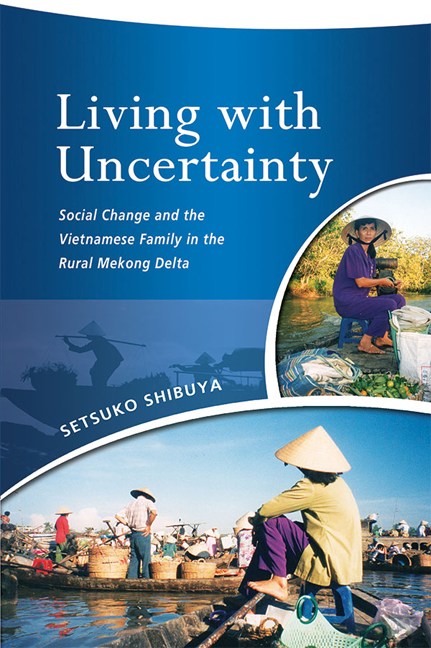Book contents
- Frontmatter
- Contents
- Acknowledgements
- 1 Introduction: Family and Society in Vietnam
- 2 On the Bank of the Mekong River
- 3 Family as the Social Unit
- 4 Farming Together
- 5 Working Outside of the Family
- 6 Education of Children and the Future
- 7 Feeling Poor
- 8 Social Change and the Family in the Rural Mekong Delta
- Bibliography
- Index
- About the Author
- Frontmatter
- Contents
- Acknowledgements
- 1 Introduction: Family and Society in Vietnam
- 2 On the Bank of the Mekong River
- 3 Family as the Social Unit
- 4 Farming Together
- 5 Working Outside of the Family
- 6 Education of Children and the Future
- 7 Feeling Poor
- 8 Social Change and the Family in the Rural Mekong Delta
- Bibliography
- Index
- About the Author
Summary
POVERTY
The villagers of Long Tuyen Village constantly mention “poverty” as the main problem in their life. When I first met them and explained that I wanted to learn about their life, the first comments I received were, “Vietnam is poor, because it is a developing country”, “in Vietnam, farmers are poor”, and “our life is difficult because we are poor”. Later on, after I had spent a few months in the village, the villagers would ask me, “Have you found out why Vietnam is poor?” or “do you know how the farmers could be helped so that we are not poor any longer?” Leshkowich states that the female market traders in Ho Chi Minh “consciously perpetuate negative stereotypes” about petty traders for their own benefit (Leshkowich 2000, p. 8). It is possible that the farmers stressed their “poor” life in to me because I was a foreigner from a rich country and they expected me to help them. However, my research suggests that the farmers’ use of the word is not only for taking advantage of “being poor”. Poverty constitutes a part of their perception of the reality that they see in their actual life, and it also forms their identity.
Are the farmers actually poor? It can be said that the villagers of Binh Thuong B Hamlet are poor in a general sense. About one third of all houses do not have electricity. Only a few have water pumps, and the rest use muddy river water for drinking and cooking, as well as for other daily purposes. Many houses are made of water coconut leaves, and many have dirt floors. The villagers do not regularly eat meat which they have to buy in the market, and they often eat only fish from the river, vegetables from their garden, and rice from their field. However, to say whether the villagers are poor in any objective sense is a difficult task beyond the scope of my work. Rather, what is important is the strong “feeling” of poverty among the farmers. Why is it so widespread and where does it come from?
Poverty is often relative or subjective, and I argue that the villagers feel poor for several reasons. First, they do not have enough money to buy things they consider necessities.
- Type
- Chapter
- Information
- Living with UncertaintySocial Change and the Vietnamese Family in the Rural Mekong Delta, pp. 183 - 211Publisher: ISEAS–Yusof Ishak InstitutePrint publication year: 2015

